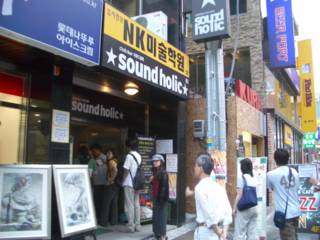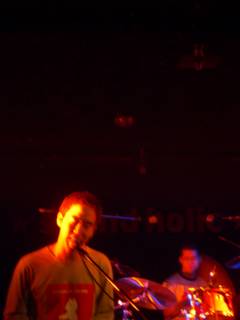
Soundholic in Seoul.

Soundholic. An outstanding name for a rock club. It's in Seoul's Hongik University district, a bustling entertainment center for the young and the hip. It's here that Tokyo's Plectrum and Swinging Popsicle did their first night's gig.

Mongoose at the Soundholic.

A Korean band named Mongoose opened for the two bands. A couple of things stand out in my mind about Mongoose.
First, the bassist.
He was sending very mixed-up fashion signals. He wore a black AC/DC T-shirt. But he sported one of those not-quite-mohawks like David Beckham had at one point, with the hair cut short on the sides rather than shaved off. He also had a moustache. Despite the bizarre fashion, he's a very nice guy, one of the Japanese musicians said.
Second, Mongoose played a cover of Plectrum's 'Cherry Boy 1994'. Giggle at the song title if you like, but it's a nice tune, and I was impressed Mongoose knew the song, not to mention learned to play it enough to perform at a show.
Until this year, Koreans couldn't buy Japanese pop music CDs. I doubt Plectrum's 'Sorry' is available even now in Korean stores. So how did Mongoose discover 'Cherry Boy 1994'? I guess somehow on-line, but it's still a thing of wonder.
Plectrum replied to Mongoose by playing the 'Cherry Boy 1994' themselves during their show that night.
***
Speaking of Korea's J-pop ban, I heard something interesting from Plectrum's guys. The night the quartet arrived in Seoul they were interviewed by a radio station. However, they weren't allowed to play on the radio a CD of theirs they brought because the songs contained Japanese lyrics. And when they did a live performance on the radio, they had to improvise and sing 'naa, naa, naa' where the Japanese lyrics would have been.
Is it really true that Koreans can buy J-pop CDs now, but they can't listen to Japanese language pop songs on the radio?
No comments:
Post a Comment